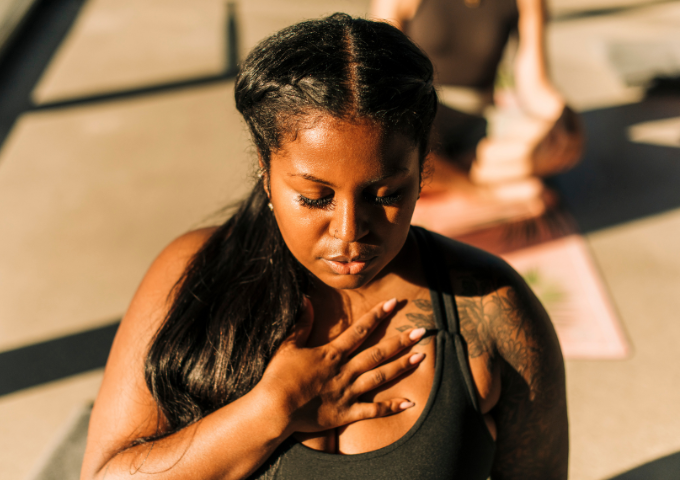What is a panic attack?
A panic attack is an episode of strong negative feelings characterised by intense fear and dread. The feelings can seem overwhelming and are often so vivid that they have physical symptoms. Panic attacks can happen at any time, be related to a stressful situation, or occur for no obvious reason.
You may know someone who has panic attacks, or you may have experienced them yourself. It is estimated that up to 35% of the population experience a panic attack at some point in their lives, and 3.7% of Australians have experienced a panic disorder within the last year.[1][2]
What are common panic attack symptoms?
A panic attack can feel intensely unpleasant and frightening, especially if it’s something you’re not used to. A panic attack will usually have physical signs. One of the more distressing symptoms of a panic attack is the way these physical symptoms can seem like physical health problems like asthma or a heart attack. Some people experiencing panic attacks report that they feel like they were “losing control” or felt like they were “about to die”. These feelings further compound the fear and dread of a panic attack.
People may experience panic attacks in different ways, but there are some common panic attack symptoms, including:
- Intense feelings of dread, fear and anxiety
- Feeling like you “can’t think straight” or “can’t handle” the situation
- A sharp increase in your heart rate
- Intense sweating, even if you’re not feeling warm
- A tight feeling in your chest
- A chilling sensation descends over your body
- Shortness of breath, a choking or smothering feeling, or feeling like you can’t inhale enough air
- Shaking or trembling
- Feeling faint, dizzy or light-headed
- Irrational thinking
- ‘Butterflies’ / ‘knots’ in your stomach or nausea
- Feeling surreal, distant or detached
- Fear of losing control or dying.
Please seek medical help if you are not sure whether your symptoms are a panic attack or are related to something else. In an emergency, call 000.
What causes panic attacks?
The precise causes of panic attacks are not yet fully understood. However, there are factors that may contribute to the likelihood of someone experiencing a panic attack. The following can play a role in panic attacks:
- Ongoing or major stress
- Experiencing traumatic events
- Excessive substance use
- A sudden change in the environment
- Temperament
- Genetic factors.
How long does a panic attack last?
A panic attack often happens unexpectedly and quickly. The negative feelings will usually be at their most intense within ten minutes before usually subsiding within half an hour.
Although the symptoms will pass, the effects of a panic attack can be deeply distressing. They can leave you shaken and worried that they may occur again.
What is the difference between a panic attack and anxiety?
A panic attack and anxiety may feel like they’re the same thing. However, they are different in a number of ways.
Panic attacks usually occur suddenly and unexpectedly. They are characterised by intense and overwhelming fear, often accompanied by physical symptoms. A panic attack can occur seemingly out of nowhere, which can make it even more distressing.
Anxiety is often associated with one or more difficult situations going on in your life. Anxiety can build up gradually and is not as abrupt as a panic attack. Anxiety may be caused by a combination of factors such as a perceived lack of control, trauma, relationship difficulties, work-related stresses, prolonged or chronic illness, money trouble, or even positive but nonetheless stressful events like marriage or births.
What is the difference between a panic attack and a panic disorder?
Generally speaking, a panic disorder is when someone experiences regular panic attacks. According to the Australian Psychological Society, a panic disorder refers to experiencing recurrent and disabling panic attacks that can last up to a few minutes. These panic attacks are accompanied by physical symptoms, such as heart palpitations, shaking, shortness of breath and dizziness. The panic attack can be expected (occur following a trigger) or unexpected. For more information, read the Australian Psychological Society’s resource on panic disorders.
A panic disorder can adversely affect and interfere with the quality of life. For example, people with a panic disorder may go to great lengths to avoid social, work or public situations for fear of having an attack.
How to cope with a panic attack
You may not be able to prevent a panic attack from occurring. However, there are things you can do to help work through the distress and regain your sense of calm and control. Here are some self-help techniques that can be beneficial:
- Try to recognise that how you feel is the result of negative feelings rather than a life-threatening situation.
- Remind yourself that the panic attack will pass.
- Focus on the present. Try to think about your immediate surroundings rather than the fear of what could happen later.
- Pick out something of interest (a pet, a moving vehicle outside your window, counting tiles, etc.) and focus on that.
- If you can, try breathing in and out slowly and deeply.
If you are unsure whether the symptoms are related to a panic attack or another health problem, please seek medical advice immediately. If it is an emergency, call 000.
Getting help for panic attacks
If you find that you experience regular panic attacks, then it’s a good idea to talk to your GP or a health professional. They can help you find ways to manage your anxiety and advise you on how to deal with panic attacks. A GP can also do a physical examination to determine if your panic attacks are related to an illness like asthma, heart problems or diabetes.
A counsellor or psychologist can also help you manage panic attacks by helping you develop coping techniques. These strategies can help you identify and challenge thoughts and behaviours that can cause feelings of panic.
If you are struggling, speak to one our SuicideLine Victoria counsellors on 1300 651 251 or you can click on the floating chat button on the right to start a web chat.
If it is an emergency, call 000.
[1] Better Health Victoria https://www.betterhealth.vic.gov.au/health/conditionsandtreatments/panic-attack
[2] Australian Bureau of Statistics (2020-2022), National Study of Mental Health and Wellbeing, ABS Website.









